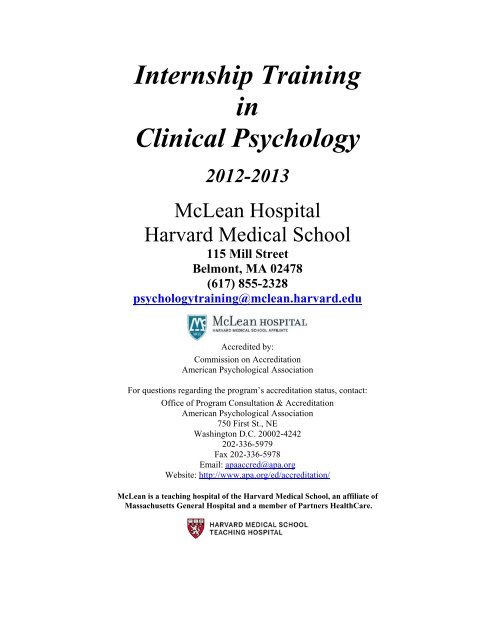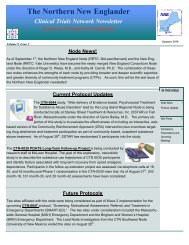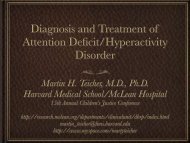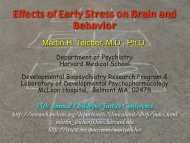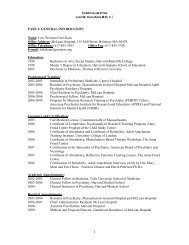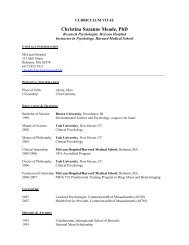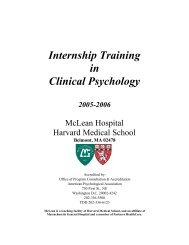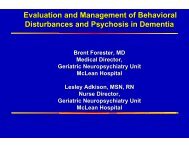Internship Training in Clinical Psychology - McLean Hospital ...
Internship Training in Clinical Psychology - McLean Hospital ...
Internship Training in Clinical Psychology - McLean Hospital ...
Create successful ePaper yourself
Turn your PDF publications into a flip-book with our unique Google optimized e-Paper software.
<strong>Internship</strong> <strong>Tra<strong>in</strong><strong>in</strong>g</strong><br />
<strong>in</strong><br />
Cl<strong>in</strong>ical <strong>Psychology</strong><br />
2012-2013<br />
<strong>McLean</strong> <strong>Hospital</strong><br />
Harvard Medical School<br />
115 Mill Street<br />
Belmont, MA 02478<br />
(617) 855-2328<br />
psychologytra<strong>in</strong><strong>in</strong>g@mclean.harvard.edu<br />
Accredited by:<br />
Commission on Accreditation<br />
American Psychological Association<br />
For questions regard<strong>in</strong>g the program’s accreditation status, contact:<br />
Office of Program Consultation & Accreditation<br />
American Psychological Association<br />
750 First St., NE<br />
Wash<strong>in</strong>gton D.C. 20002-4242<br />
202-336-5979<br />
Fax 202-336-5978<br />
Email: apaaccred@apa.org<br />
Website: http://www.apa.org/ed/accreditation/<br />
<strong>McLean</strong> is a teach<strong>in</strong>g hospital of the Harvard Medical School, an affiliate of<br />
Massachusetts General <strong>Hospital</strong> and a member of Partners HealthCare.
<strong>McLean</strong> <strong>Hospital</strong>/Harvard Medical School<br />
Belmont, Massachusetts<br />
INTERNSHIP TRAINING PROGRAM IN CLINICAL PSYCHOLOGY 2011-2012<br />
<strong>McLean</strong> <strong>Hospital</strong>/Harvard Medical School offers a full-time Pre-doctoral Cl<strong>in</strong>ical <strong>Psychology</strong><br />
<strong>Internship</strong>, accredited by the Commission on Accreditation of the American Psychological<br />
Association, to eligible third, fourth-year or higher graduate students enrolled <strong>in</strong> either APA-<br />
Approved cl<strong>in</strong>ical or counsel<strong>in</strong>g psychology doctoral programs. A stipend of $23,000, the choice of<br />
a fully paid health plan, 12 paid holidays plus 20 days vacation are also provided. In addition, all<br />
<strong>in</strong>terns receive appo<strong>in</strong>tments at Harvard Medical School, Department of Psychiatry. This academic<br />
appo<strong>in</strong>tment allows access to a wide array of university resources, facilities and programs.<br />
It is anticipated that there will be six funded <strong>in</strong>tern positions available for the 2012-2013 academic<br />
year. The <strong>McLean</strong> <strong>Hospital</strong>/Harvard Medical School <strong>in</strong>ternship is committed to provid<strong>in</strong>g its<br />
tra<strong>in</strong>ees with the highest quality cl<strong>in</strong>ical, research and supervisory experiences designed to develop<br />
the necessary competencies that will prepare them for challeng<strong>in</strong>g psychology careers.<br />
Our tra<strong>in</strong><strong>in</strong>g program participates <strong>in</strong> the APPIC <strong>Internship</strong> Match Program and observes all of its<br />
guidel<strong>in</strong>es. <strong>McLean</strong> <strong>Hospital</strong> and the Harvard Medical School are firmly committed to equal<br />
opportunity for all without regard to race, color, sex, age, religion, national orig<strong>in</strong>, gender preference<br />
or handicap.<br />
DESCRIPTION OF INSTITUTION<br />
<strong>McLean</strong> <strong>Hospital</strong> is a private, non-profit, psychiatric hospital <strong>in</strong> Belmont, Massachusetts, an<br />
attractive suburban community just a few miles west of Boston. The hospital has 40 build<strong>in</strong>gs on<br />
140 beautiful acres of land. Founded <strong>in</strong> 1811, <strong>McLean</strong> is affiliated with Massachusetts General<br />
<strong>Hospital</strong> (MGH), the Partners HealthCare System and is the major psychiatric teach<strong>in</strong>g hospital of<br />
the Harvard Medical School. In addition to <strong>in</strong>ternships and postdoctoral fellowships <strong>in</strong> psychology,<br />
there are active tra<strong>in</strong><strong>in</strong>g programs for psychiatric residents, medical, social work, and nurs<strong>in</strong>g<br />
students. The hospital enjoys a national and <strong>in</strong>ternational reputation for its excellence <strong>in</strong> cl<strong>in</strong>ical<br />
care, teach<strong>in</strong>g, and research. For example, <strong>McLean</strong> has long been judged to be the nation’s top rated<br />
free-stand<strong>in</strong>g psychiatric hospital by US News and World Report. It is also ranked <strong>in</strong> the top five<br />
percent of all hospitals receiv<strong>in</strong>g National Institute of Health research funds with more than $45<br />
million of annual research revenues. <strong>McLean</strong> is accredited by The Jo<strong>in</strong>t Commission and licensed by<br />
the Massachusetts Departments of Public Health and Mental Health.<br />
In response to the many changes occurr<strong>in</strong>g <strong>in</strong> behavioral health care delivery the hospital has shifted<br />
from its historical <strong>in</strong>patient focus and is now a comprehensive care system that <strong>in</strong>cludes <strong>in</strong>patient,<br />
partial hospital, residential, school based and outpatient services. Our tra<strong>in</strong><strong>in</strong>g program reflects these<br />
changes and provides tra<strong>in</strong>ees with experiences that teach them how to keep pace with the rapidly<br />
2
evolv<strong>in</strong>g behavioral health field. The <strong>McLean</strong> <strong>Hospital</strong> <strong>in</strong>ternship cont<strong>in</strong>ues its long tradition of<br />
offer<strong>in</strong>g the highest quality comprehensive tra<strong>in</strong><strong>in</strong>g designed to prepare students to pursue their<br />
academic, cl<strong>in</strong>ical and research objectives. The Program was recognized by APPIC as the 2006<br />
recipient of the Award for Excellence <strong>in</strong> Cl<strong>in</strong>ical <strong>Tra<strong>in</strong><strong>in</strong>g</strong>. Interested applicants are encouraged to<br />
visit the <strong>Hospital</strong>’s Website at www.mclean.harvard.edu to learn more about our cl<strong>in</strong>ical, research<br />
and tra<strong>in</strong><strong>in</strong>g activities.<br />
THE INTERNSHIP TRAINING PROGRAM<br />
INTRODUCTION<br />
The <strong>McLean</strong> <strong>Psychology</strong> <strong>Internship</strong> is designed to provide <strong>in</strong>terns with tra<strong>in</strong><strong>in</strong>g experiences that will<br />
develop competencies <strong>in</strong> a wide range of empirically supported treatments that can be effectively<br />
utilized with a full spectrum of mental health disorders. While behavior therapy (BT) and cognitive<br />
behavior therapy (CBT) orientations are most prevalent, there are opportunities to receive<br />
supervision <strong>in</strong> a variety of biopsychosocial perspectives. Our objective is to develop professional<br />
psychologists who epitomize the scientist-practitioner model. This is accomplished by teach<strong>in</strong>g<br />
<strong>in</strong>terns to translate theory <strong>in</strong>to practice, better understand the relationship between evidence-based<br />
practice and practice-based evidence, comprehensively assess patients and plan for their effective<br />
treatment, recognize the importance of respect <strong>in</strong> work with patients and colleagues, develop<br />
effective therapeutic relationships, be creative <strong>in</strong> cl<strong>in</strong>ical <strong>in</strong>terventions, show sensitivity to<br />
<strong>in</strong>dividuals <strong>in</strong> their ethnic, racial and cultural context while adher<strong>in</strong>g to the highest ethical standards.<br />
Other elements of tra<strong>in</strong><strong>in</strong>g <strong>in</strong>clude many substantial opportunities for <strong>in</strong>terns to pursue research<br />
<strong>in</strong>terests and to develop healthcare adm<strong>in</strong>istrative skills. The <strong>in</strong>ternship is comprised of the<br />
follow<strong>in</strong>g three areas:<br />
1) Core Program: Approximately 70% of an <strong>in</strong>tern’s time is devoted to a comb<strong>in</strong>ation of the<br />
follow<strong>in</strong>g:<br />
• Year long <strong>in</strong>tensive cl<strong>in</strong>ical tra<strong>in</strong><strong>in</strong>g while work<strong>in</strong>g with a full spectrum of adult<br />
psychopathology <strong>in</strong> the <strong>McLean</strong> Behavioral Health Partial <strong>Hospital</strong> Program (BHP)<br />
• Short-term focused therapy <strong>in</strong> the BHP as well as other hospital sett<strong>in</strong>gs<br />
• <strong>Tra<strong>in</strong><strong>in</strong>g</strong> rotations <strong>in</strong> substance abuse and serious mental illness<br />
• Individual psychotherapy experiences <strong>in</strong> partial hospital, outpatient and <strong>in</strong>patient sett<strong>in</strong>gs<br />
• Group psychotherapy <strong>in</strong> partial hospital and <strong>in</strong>patient sett<strong>in</strong>gs<br />
• Comprehensive cl<strong>in</strong>ical and research supervision<br />
• Ongo<strong>in</strong>g treatment outcome evaluation <strong>in</strong> a naturalistic sett<strong>in</strong>g<br />
• A variety of didactic sem<strong>in</strong>ars<br />
2) Cl<strong>in</strong>ical, Research, and Adm<strong>in</strong>istrative Electives: In addition to the core program, time is<br />
made available for <strong>in</strong>terns to pursue elective tra<strong>in</strong><strong>in</strong>g experiences. Electives are designed to<br />
augment core tra<strong>in</strong><strong>in</strong>g by provid<strong>in</strong>g <strong>in</strong>terns with a variety of options to pursue their special<br />
<strong>in</strong>terests. There are many more elective opportunities than any <strong>in</strong>tern can pursue dur<strong>in</strong>g the<br />
tra<strong>in</strong><strong>in</strong>g year so selection takes <strong>in</strong>to account schedul<strong>in</strong>g and time commitment considerations.<br />
3
3) Intern Support: There are a variety of significant resources available that are specifically<br />
designed to support an <strong>in</strong>tern’s professional and personal development.<br />
CORE PROGRAM<br />
I. BEHAVIORAL HEALTH PARTIAL HOSPITAL PROGRAM:<br />
A) Overview<br />
• The Behavioral Health Partial <strong>Hospital</strong> Program is the <strong>in</strong>tern’s primary cl<strong>in</strong>ical tra<strong>in</strong><strong>in</strong>g<br />
placement (30 +/- hours per week). The BHP is an <strong>in</strong>tegrated program that treats patients <strong>in</strong><br />
all major DSM-IV diagnostic categories. It provides sophisticated psychosocial and milieu<br />
treatments which are empirically <strong>in</strong>formed and adapted to the current behavioral health<br />
practices, the efficacy of which is evaluated by the BHP’s active treatment outcome research<br />
<strong>in</strong>itiatives. Specialty tracks with<strong>in</strong> BHP <strong>in</strong>clude: the Mood and Anxiety Program (MAP), the<br />
Borderl<strong>in</strong>e Personality Disorder Program, and the General Adult Psychiatry Program (GAP)<br />
for Bipolar and Psychotic Disorders. The BHP plays a critical role <strong>in</strong> provid<strong>in</strong>g a<br />
comprehensive array of cl<strong>in</strong>ical services that allow patients to either avoid the need for<br />
<strong>in</strong>patient hospitalization or to help them build necessary skills to facilitate the smooth<br />
transition from the crisis stabilization functions of <strong>in</strong>patient care to the far less <strong>in</strong>tensive<br />
resources available <strong>in</strong> most outpatient sett<strong>in</strong>gs.<br />
• The Behavioral Health Partial <strong>Hospital</strong> Program is an active and well <strong>in</strong>tegrated component<br />
of the <strong>McLean</strong> system of care. Dur<strong>in</strong>g the past year, there were over 850 admissions (70+<br />
admissions per month). The BHP provides an impressive range of <strong>in</strong>dividual and group<br />
therapy as well as diagnostic services. A substantial number of patients are referred from<br />
<strong>McLean</strong> <strong>in</strong>patient units with the rema<strong>in</strong>der from local hospitals, community mental health<br />
centers, private practitioners and self-referrals.<br />
• Interns engage <strong>in</strong> a variety of professional activities <strong>in</strong>clud<strong>in</strong>g: <strong>in</strong>dividual and group<br />
psychotherapy, consultation, assessment, evaluation, psychosocial milieu treatments and<br />
case management.<br />
• Interns play a critical role <strong>in</strong> the BHP Consultation-Liaison Service (C/L) where they<br />
provide cl<strong>in</strong>ical assessments and follow-up treatments as members of this closely supervised<br />
service.<br />
• Group therapy is a major component of treatment <strong>in</strong> the BHP and here, too, <strong>in</strong>terns play a<br />
central role. They lead, co-lead and often develop many of the program’s therapy groups.<br />
Interns are assigned to groups based on their <strong>in</strong>terests, tra<strong>in</strong><strong>in</strong>g and programmatic needs.<br />
4
• Individual and group supervision, co-therapy with senior cl<strong>in</strong>icians, “real time” cl<strong>in</strong>ical<br />
observation, <strong>in</strong>service tra<strong>in</strong><strong>in</strong>g and case conferences assist the <strong>in</strong>tern <strong>in</strong> maximiz<strong>in</strong>g the<br />
educational potential of their BHP experience.<br />
• All <strong>in</strong>terns participate <strong>in</strong> BHP treatment outcome evaluation <strong>in</strong> an acute naturalistic sett<strong>in</strong>g<br />
and for those seek<strong>in</strong>g a more <strong>in</strong>tensive experience, there are many opportunities to work with<br />
exist<strong>in</strong>g data sets or to develop their own related studies.<br />
B) Intern Roles <strong>in</strong> the BHP<br />
• Consultant: The BHP’s Short-Term Therapy Program, otherwise known as the C/L Service,<br />
provides consultations and follow-up treatment for patients admitted to the program. Interns<br />
are assigned to a C-L team that places a premium on cl<strong>in</strong>ical tra<strong>in</strong><strong>in</strong>g. While <strong>in</strong>terns provide<br />
the vast majority of <strong>in</strong>dividual therapy <strong>in</strong> the BHP, each case assignment is framed first as a<br />
consultation to address the specific referral requests. An <strong>in</strong>tern meets with the patient one or<br />
two times to complete an <strong>in</strong>terview assessment, develop a proposed treatment plan, present<br />
the case <strong>in</strong> C-L rounds and then communicate this <strong>in</strong>formation to the referr<strong>in</strong>g cl<strong>in</strong>ician. If<br />
accepted, the <strong>in</strong>tern is then responsible for implement<strong>in</strong>g the treatment recommendations.<br />
• Psychotherapist: After complet<strong>in</strong>g a consultation <strong>in</strong>terns typically follow up with patients<br />
<strong>in</strong> a highly focused and <strong>in</strong>tensive therapeutic <strong>in</strong>tervention. The treatment tends to be BT and<br />
CBT oriented, although not limited to these theoretical models. Therapy is pragmatic, goal<br />
directed and may <strong>in</strong>clude elements of <strong>in</strong>terpersonal, psychodynamic and client centered<br />
models. Individual therapy technique competencies are developed along with skills designed<br />
to build a therapeutic relationship the <strong>in</strong>creases the treatment efficacy.<br />
• Group Therapy Leader and Co-Leader: Interns will lead and co-lead approximately six to<br />
eight BHP groups per week. Groups <strong>in</strong>clude: Skills-based groups which are structured with<br />
flexible protocols (e.g., CBT skills, stress management, impulse control, self-assessment,<br />
behavioral schedul<strong>in</strong>g, wellness, relapse prevention, communication skills etc); Psycho<br />
education groups for various diagnoses (e.g., Depression, Anxiety, Bipolar Disorder,<br />
Borderl<strong>in</strong>e Personality Disorder, Psychotic Disorders); Process groups with a particular<br />
focus (e.g., Liv<strong>in</strong>g with Mood and Anxiety Disorders, Interpersonal Group, Personality and<br />
Relationships, Family Issues, Life Transitions). As a result of this closely supervised tra<strong>in</strong><strong>in</strong>g<br />
experience the <strong>in</strong>tern develops a wide range of group therapy competencies.<br />
• Cl<strong>in</strong>ical Case Management: Each <strong>in</strong>tern completes a three-month case management<br />
rotation. This provides them with a comprehensive “pragmatic” learn<strong>in</strong>g experience. Interns<br />
supervised by the Cl<strong>in</strong>ical Team Manager work closely with other members of a<br />
multidiscipl<strong>in</strong>ary treatment team coord<strong>in</strong>at<strong>in</strong>g and implement<strong>in</strong>g the patient’s treatment plan.<br />
This case management role <strong>in</strong>cludes admission assessment, treatment plann<strong>in</strong>g, family<br />
<strong>in</strong>tervention, coord<strong>in</strong>ation of aftercare, risk assessment and crisis management. Interns also<br />
learn the <strong>in</strong>tricacies of negotiat<strong>in</strong>g managed care cl<strong>in</strong>ical reviews. This case manager tra<strong>in</strong><strong>in</strong>g<br />
allows them to develop competencies <strong>in</strong> <strong>in</strong>tegrat<strong>in</strong>g milieu treatment with care delivery<br />
pragmatics such as: needs assessment, therapeutic contract<strong>in</strong>g, treatment plann<strong>in</strong>g,<br />
5
adm<strong>in</strong>istrative skills, <strong>in</strong>dividual/group therapy and multidiscipl<strong>in</strong>ary team management.<br />
II.<br />
ADJUNCTIVE CLINICAL SERVICES:<br />
A) Overview<br />
Additional tra<strong>in</strong><strong>in</strong>g opportunities are offered <strong>in</strong> short- and long-term treatment utiliz<strong>in</strong>g a variety<br />
of approaches <strong>in</strong>clud<strong>in</strong>g BT, CBT, DBT, relational, <strong>in</strong>terpersonal, and biopsychosocial <strong>in</strong>formed<br />
models. Interns will engage <strong>in</strong> approximately 4-6 hours per week of <strong>in</strong>dividual psychotherapy<br />
outside the BHP <strong>in</strong> one or more of the follow<strong>in</strong>g cl<strong>in</strong>ical services:<br />
• Bipolar and psychosis research cl<strong>in</strong>ic is a small outpatient service that provides empirically<br />
supported psychotherapy services <strong>in</strong> the context of concurrent psychopharmacological<br />
outcome studies.<br />
• Appleton Adult Residential Treatment program is a 25-bed long term <strong>in</strong>tensive residential<br />
program located on the <strong>McLean</strong> campus that serves the needs of patients with serious and<br />
persistent mental illness.<br />
• Ed<strong>in</strong>burg Center is a local well respected <strong>McLean</strong> affiliated community based outpatient<br />
cl<strong>in</strong>ic that offers a wide spectrum of outpatient psychotherapeutic services.<br />
III.<br />
SUPERVISION<br />
A) Advisor<br />
• Each <strong>in</strong>tern meets weekly with their assigned advisor (a Co-Director of <strong>Tra<strong>in</strong><strong>in</strong>g</strong>) to discuss<br />
tra<strong>in</strong><strong>in</strong>g goals, professional development and general concerns regard<strong>in</strong>g the tra<strong>in</strong><strong>in</strong>g<br />
experience.<br />
• The <strong>McLean</strong> tra<strong>in</strong><strong>in</strong>g program makes every effort to support the <strong>in</strong>tern’s professional and<br />
personal development. This is addressed throughout the tra<strong>in</strong><strong>in</strong>g year by didactic and process<br />
oriented sem<strong>in</strong>ars as well as <strong>in</strong>dividual meet<strong>in</strong>gs with their advisor and other supervisors.<br />
B) Supervision for Individual Psychotherapy<br />
• Each <strong>in</strong>tern is assigned to at least four cl<strong>in</strong>ical supervisors who have <strong>in</strong>dividual weekly<br />
meet<strong>in</strong>gs with the tra<strong>in</strong>ee.<br />
• Much effort is directed to help <strong>in</strong>terns match cases with supervisors (e.g., supervisors<br />
designated for short-term, time-limited treatment, other supervisors for longer-term<br />
dynamically oriented therapy).<br />
• In the Consultation-Liaison service, <strong>in</strong>terns attend twice-weekly rounds which are designed<br />
to provide <strong>in</strong>tensive closely supervised cl<strong>in</strong>ical tra<strong>in</strong><strong>in</strong>g. This <strong>in</strong>cludes thorough assessment,<br />
treatment plann<strong>in</strong>g, report writ<strong>in</strong>g, communication of recommendations to the referral source<br />
and follow-up treatment.<br />
• Additional supervision is available for <strong>in</strong>terns who have a particular <strong>in</strong>terest <strong>in</strong> a specialized<br />
area (e.g., a particular diagnostic category or treatment approach).<br />
6
C) Supervision for Group Psychotherapy<br />
• Over the course of the year <strong>in</strong>terns will lead over 150 groups. Given that most tra<strong>in</strong>ees enter<br />
<strong>in</strong>ternship with a paucity of group experience, development of group therapy competencies<br />
represents one of the <strong>in</strong>ternship’s steepest learn<strong>in</strong>g curves.<br />
• <strong>Tra<strong>in</strong><strong>in</strong>g</strong> for group therapy beg<strong>in</strong>s with <strong>in</strong>terns observ<strong>in</strong>g groups lead by senior staff, colead<strong>in</strong>g<br />
with staff and <strong>in</strong> didactic sem<strong>in</strong>ars. Didactics <strong>in</strong>clude a foundation <strong>in</strong><br />
conceptualizations of group therapy, BT/CBT applied <strong>in</strong> group formats, empirically<br />
supported treatments, group process techniques and protocol development.<br />
• For the first few months of the tra<strong>in</strong><strong>in</strong>g year <strong>in</strong>terns are often assigned to co-lead groups with<br />
senior staff.<br />
• Once <strong>in</strong>terns beg<strong>in</strong> lead<strong>in</strong>g their own groups, supervision is oriented to trouble-shoot<strong>in</strong>g,<br />
problem solv<strong>in</strong>g and advanc<strong>in</strong>g group leadership competencies.<br />
• Didactic sem<strong>in</strong>ars and cl<strong>in</strong>ical supervision cont<strong>in</strong>ue throughout the year.<br />
• Senior staff members often observe <strong>in</strong>terns lead<strong>in</strong>g groups. This experience provides tra<strong>in</strong>ees<br />
with the opportunity for real time supervision and feedback.<br />
D) Ongo<strong>in</strong>g Faculty Collaboration<br />
• Interns <strong>in</strong>teract with numerous cl<strong>in</strong>ician faculty on a daily basis.<br />
• There are plentiful opportunities for role model<strong>in</strong>g and co-therapy.<br />
• All <strong>in</strong>terns attend rounds and case conferences lead by cl<strong>in</strong>ical faculty.<br />
IV.<br />
SEMINARS AND OTHER ACTIVITIES<br />
A) Core Sem<strong>in</strong>ars: Each of these year long sem<strong>in</strong>ars is offered on a weekly or biweekly basis.<br />
• Theories and Practice Sem<strong>in</strong>ar: This weekly sem<strong>in</strong>ar, lead by Drs. Björgv<strong>in</strong>sson and<br />
Taylor, serves as the ma<strong>in</strong>stay sem<strong>in</strong>ar for the <strong>in</strong>ternship year. It provides <strong>in</strong>terns with<br />
focused cl<strong>in</strong>ical tra<strong>in</strong><strong>in</strong>g <strong>in</strong> psychosocial-milieu treatment, <strong>in</strong>dividual and group therapies,<br />
consultation-liaison, case formulation, treatment plann<strong>in</strong>g and evaluation, diagnosis of<br />
severe psychopathology, translation of theory <strong>in</strong>to practice, professional development and<br />
opportunities for weekly problem-solv<strong>in</strong>g.<br />
• Cognitive Behavior Therapy: Intensive CBT didactic tra<strong>in</strong><strong>in</strong>g is provided by a team of<br />
faculty members. It covers group and <strong>in</strong>dividual therapies, pragmatics of treatment and<br />
translation of empirically supported treatments <strong>in</strong>to a cl<strong>in</strong>ical environment. Case<br />
presentations, observation, supervision are among the teach<strong>in</strong>g methods employed.<br />
• Psychodynamic Psychotherapy Sem<strong>in</strong>ar: Weekly sem<strong>in</strong>ar reviews basic foundations of<br />
psychodynamic theory and practice, as well as more advanced topics and is augmented with<br />
case discussions.<br />
B) Special Topics Sem<strong>in</strong>ars: Each of these is presented <strong>in</strong> a two to four hour didactic sem<strong>in</strong>ar<br />
format by a <strong>Psychology</strong> Department faculty member who has a specialty <strong>in</strong> that area. Topics<br />
may vary from year to year and can <strong>in</strong>clude:<br />
• Neuroscience of psychopathology and behavior<br />
• Neuropsychological assessment<br />
7
• Professional Development Issues<br />
• Diversity and Multi-Culturalism<br />
• Borderl<strong>in</strong>e Personality Disorder<br />
• Suicide<br />
• Para-Suicidality and Self-Destructive Behaviors<br />
• Psychopharmacology<br />
• Dual Diagnosis: Psychiatric/Substance Abuse<br />
• Psychotherapy for Bipolar Disorder<br />
• Dissociative Disorders and PTSD<br />
• Family Therapy<br />
• Treatment of Adolescents<br />
• Ethics and Practice<br />
• Private Practice Issues<br />
• Psychotherapy Supervision<br />
Elective Special Topic Sem<strong>in</strong>ars<br />
• Hypnotherapy<br />
• Sports and Performance <strong>Psychology</strong><br />
• Positive <strong>Psychology</strong><br />
C) Inter-Discipl<strong>in</strong>ary <strong>Tra<strong>in</strong><strong>in</strong>g</strong> Activities<br />
• Inter-discipl<strong>in</strong>ary <strong>Tra<strong>in</strong><strong>in</strong>g</strong> with Psychiatry Residency Program: <strong>Psychology</strong> <strong>in</strong>terns<br />
often participate <strong>in</strong> weekly meet<strong>in</strong>gs with <strong>McLean</strong>/MGH psychiatric residents to discuss<br />
cases and a variety of other cl<strong>in</strong>ical issues.<br />
• Case Conference—Assessment and Formulation: A senior cl<strong>in</strong>ician from the BHP meets<br />
with <strong>in</strong>terns monthly to <strong>in</strong>terview a patient. This is then followed by a case discussion.<br />
• Psychopharmacology: A psychiatrist from the BHP meets with <strong>in</strong>terns to review<br />
pharmacological treatment strategies. Live <strong>in</strong>terviews of patients are often part of this<br />
sem<strong>in</strong>ar.<br />
• <strong>Hospital</strong>-Wide Case Conferences and Grand Rounds: Interns are encouraged to attend<br />
case conferences, consultations and Grand Rounds.<br />
ELECTIVES<br />
I. CLINICAL, RESEARCH, AND ADMINISTRATIVE ELECTIVES<br />
In addition to the primary BHP placement and its adjunctive cl<strong>in</strong>ical services, the <strong>McLean</strong><br />
<strong>Hospital</strong> <strong>in</strong>ternship offers a variety of electives. Electives are selected <strong>in</strong> consultation with the<br />
<strong>in</strong>tern’s advisor. Each elective varies <strong>in</strong> regard to time commitment and the extent of<br />
<strong>in</strong>volvement. Electives may account for up to 30% of an <strong>in</strong>tern’s time and vary from 2-10 month<br />
commitments.<br />
8
Electives are based on an <strong>in</strong>tern’s specific tra<strong>in</strong><strong>in</strong>g needs and <strong>in</strong>terests. The follow<strong>in</strong>g are elective<br />
sites that have been very popular with former <strong>in</strong>terns and all will be available <strong>in</strong> the 2012-2013<br />
<strong>in</strong>ternship year. In addition other elective opportunities often arise dur<strong>in</strong>g the course of the year.<br />
A) Cl<strong>in</strong>ical Electives<br />
• Dialectic Behavior Therapy Outpatient Cl<strong>in</strong>ic: Interns have an opportunity to tra<strong>in</strong> with<br />
senior DBT therapists by co-lead<strong>in</strong>g groups and participat<strong>in</strong>g <strong>in</strong> a consultation team.<br />
• Cl<strong>in</strong>ical Evaluation Center: This is the <strong>McLean</strong> <strong>Hospital</strong> admission service. Here the <strong>in</strong>tern<br />
is tra<strong>in</strong>ed to evaluate and make disposition plans for patients <strong>in</strong> the most acute phase of their<br />
illness. The <strong>in</strong>tern works on a multi-discipl<strong>in</strong>ary team with psychiatrists, nurses, social<br />
workers and residents to stabilize acutely ill adult patients with a wide range of diagnoses.<br />
Emphasis is placed on assess<strong>in</strong>g mental status, risk assessment for suicide, for violence and<br />
medical necessity for treatment. Interns are closely supervised <strong>in</strong> this rich tra<strong>in</strong><strong>in</strong>g<br />
environment.<br />
• Obsessive-Compulsive Disorder Institute: Located on the <strong>McLean</strong> campus this jo<strong>in</strong>t<br />
cl<strong>in</strong>ical collaboration between <strong>McLean</strong> and MGH provides <strong>in</strong>terns with the opportunity to be<br />
<strong>in</strong>volved <strong>in</strong> a comprehensive residential treatment facility that employs state-of-the-art<br />
BT/CBT and psychopharmacological treatments for these difficult disorders.<br />
• Klarman Eat<strong>in</strong>g Disorders Center: A variety of tra<strong>in</strong><strong>in</strong>g opportunities are available for<br />
<strong>in</strong>terns to work with eat<strong>in</strong>g disordered patients. This program treats girls and young women<br />
(ages 13-23) <strong>in</strong> a state-of-the-art <strong>in</strong>tensive residential and partial hospital treatment sett<strong>in</strong>g.<br />
• Neuropsychological Assessment: This year-long elective (8+ hours per week) provides an<br />
opportunity for neuropsychological assessment with diverse patient populations (e.g.,<br />
geriatric with suspected dementia, psychiatric patients with cognitive compromises, and<br />
adolescents with learn<strong>in</strong>g disabilities). In addition to supervised test<strong>in</strong>g experiences, tra<strong>in</strong><strong>in</strong>g<br />
<strong>in</strong>cludes a didactic component and participation <strong>in</strong> neurology rounds.<br />
• Child and Adolescent Services: Opportunities are available for <strong>in</strong>dividual and group<br />
treatment <strong>in</strong> these acute residential and partial hospital sett<strong>in</strong>gs.<br />
• Borderl<strong>in</strong>e Personality Disorder Outpatient Cl<strong>in</strong>ic: In addition to DBT tra<strong>in</strong><strong>in</strong>g, <strong>in</strong>terns<br />
also have opportunities to learn about more psychodynamic approaches by attend<strong>in</strong>g weekly<br />
case conferences and work<strong>in</strong>g with <strong>in</strong>dividual patients.<br />
• Substance Abuse Services: There are a variety of cl<strong>in</strong>ical opportunities available for <strong>in</strong>terns<br />
to work with adults <strong>in</strong> the <strong>in</strong>patient, partial hospital and residential substance abuse<br />
programs.<br />
• Inpatient Treatment: <strong>McLean</strong> has a variety of <strong>in</strong>patient units which treat psychotic and<br />
severe bipolar disorders, mood disorders and personality disorders, dissociative disorders,<br />
substance abuse disorders and geriatrics. Interns who are <strong>in</strong>terested will have elective<br />
opportunities to work <strong>in</strong> these sett<strong>in</strong>gs.<br />
B) Research Electives<br />
<strong>McLean</strong> is one of the premier psychiatric research <strong>in</strong>stitutions <strong>in</strong> the country and its faculty is<br />
engaged <strong>in</strong> an impressive array of basic neuroscience, medication trials and treatment outcome<br />
research. As a result, tra<strong>in</strong>ees have many options to participate <strong>in</strong> areas of research that are<br />
consistent with their <strong>in</strong>terests.<br />
9
• Treatment Outcome. As referenced above there is an ongo<strong>in</strong>g research program <strong>in</strong> the<br />
Behavioral Health Partial <strong>Hospital</strong> Program that addresses several areas: treatment outcome<br />
<strong>in</strong> a naturalistic sett<strong>in</strong>g, predictors of improved function<strong>in</strong>g and mechanisms of change <strong>in</strong><br />
CBT treatment. All <strong>in</strong>terns participate <strong>in</strong> this unique research program and for those seek<strong>in</strong>g<br />
a more <strong>in</strong>tensive experience, a research elective provides many opportunities to work with<br />
exist<strong>in</strong>g data sets or to develop their own related studies.<br />
• Cl<strong>in</strong>ical Research Electives: Several of the cl<strong>in</strong>ical specialty area elective sites previously<br />
described also provide <strong>in</strong>terns with the opportunity to become <strong>in</strong>volved <strong>in</strong> ongo<strong>in</strong>g research<br />
projects.<br />
• Individual Research Project: In the past, <strong>in</strong>terns have designed and implemented their own<br />
research projects. To accomplish this, an <strong>in</strong>tern must be highly motivated, be well organized<br />
and have a study design that <strong>in</strong>corporates the practicalities of collect<strong>in</strong>g data <strong>in</strong> a naturalistic<br />
cl<strong>in</strong>ical sett<strong>in</strong>g.<br />
C) Adm<strong>in</strong>istrative Elective<br />
• <strong>Hospital</strong> Adm<strong>in</strong>istration: Dr. Levendusky meets biweekly with <strong>in</strong>terns to discuss healthcare<br />
and hospital adm<strong>in</strong>istration. Topics <strong>in</strong>clude regulatory issues, reimbursement models,<br />
strategic plann<strong>in</strong>g, program development and fiscal model<strong>in</strong>g.<br />
INTERN SUPPORT<br />
I. PROGRAM VALUES, TRAINING OBJECTIVES, AND RESOURCES<br />
A) F<strong>in</strong>d<strong>in</strong>g Balance<br />
• Support and Self-Care: <strong>Internship</strong> is an excit<strong>in</strong>g year! It is obviously a time for both<br />
personal and professional development. However, f<strong>in</strong>d<strong>in</strong>g a balance between one’s personal<br />
and professional demands can be a significant challenge. Recogniz<strong>in</strong>g this, the <strong>McLean</strong><br />
faculty offers ongo<strong>in</strong>g support throughout the year to assist <strong>in</strong>terns to achieve a healthy and<br />
productive balance.<br />
• Professional and Personal Development: <strong>Internship</strong> can be stressful and it is sometimes<br />
difficult for an <strong>in</strong>tern to ask for added help or support. The program is designed with both<br />
structured and unstructured means of support to promote an <strong>in</strong>tern’s professional as well as<br />
personal growth.<br />
B) <strong>McLean</strong>-Based Support<br />
• Advisor: As described above, each <strong>in</strong>tern is assigned to one of the co-directors of tra<strong>in</strong><strong>in</strong>g<br />
who will serve as their advisor throughout the year. In weekly meet<strong>in</strong>gs the emphasis is on<br />
professional development <strong>in</strong>clud<strong>in</strong>g: optimiz<strong>in</strong>g the <strong>in</strong>tern’s tra<strong>in</strong><strong>in</strong>g experience, decisions<br />
about electives, career plann<strong>in</strong>g (e.g., options for post-doctoral tra<strong>in</strong><strong>in</strong>g or job search) and<br />
problem solv<strong>in</strong>g. Additionally the advisor and <strong>in</strong>tern cont<strong>in</strong>ually review the <strong>in</strong>tern’s progress<br />
to <strong>in</strong>sure that the tra<strong>in</strong><strong>in</strong>g objectives are be<strong>in</strong>g met.<br />
• Intern Group: This weekly <strong>in</strong>tern group represents an experiential component of group<br />
therapy tra<strong>in</strong><strong>in</strong>g. The group facilitator is a senior faculty member, who preserves<br />
10
confidentiality of <strong>in</strong>terns and thus provides <strong>in</strong>terns with an opportunity to speak openly about<br />
their tra<strong>in</strong><strong>in</strong>g issues. The <strong>in</strong>tern group functions <strong>in</strong>dependently of the <strong>in</strong>ternship’s evaluative<br />
process. This allows tra<strong>in</strong>ees to address group process with<strong>in</strong> the <strong>in</strong>tern cohort.<br />
• Professional and Personal Development Sem<strong>in</strong>ars: Throughout the year sem<strong>in</strong>ars are held<br />
to address issues such as professional identity, balanc<strong>in</strong>g professional/personal life, self-care<br />
and the experience of work<strong>in</strong>g with difficult or challeng<strong>in</strong>g patients.<br />
• Evaluations: Interns are first formally evaluated early <strong>in</strong> the year (September/October) with<br />
the aim of be<strong>in</strong>g proactive <strong>in</strong> identify<strong>in</strong>g areas that may require added tra<strong>in</strong><strong>in</strong>g opportunities<br />
to either resolve problematic issues or help facilitate more advanced experiences for<br />
enhanced skill development. In addition, a second formal evaluation is scheduled for later <strong>in</strong><br />
the year (March/April) that is designed to provide <strong>in</strong>terns with feedback on their progress<br />
towards meet<strong>in</strong>g tra<strong>in</strong><strong>in</strong>g objectives as well as progress towards achiev<strong>in</strong>g their post<br />
<strong>in</strong>ternship career goals. Both of these evaluations are <strong>in</strong> addition to the ongo<strong>in</strong>g evaluative<br />
feedback offered by advisor and supervisors throughout the year.<br />
C) Harvard Medical School Support Resources<br />
• Low-Fee Psychotherapy: All tra<strong>in</strong>ees <strong>in</strong> the Harvard system can avail themselves of a lowfee<br />
psychotherapy program. The psychotherapy is provided through therapist’s private<br />
practice and may be covered by <strong>in</strong>surance. Otherwise, fees are set on an “ability to pay”<br />
slid<strong>in</strong>g-scale. Given the professional and personal challenges that <strong>in</strong>terns sometimes face<br />
dur<strong>in</strong>g the year this can prove to be a valuable resource.<br />
• AHANA <strong>Psychology</strong> Program (African American, Hispanic (Lat<strong>in</strong>o), Asian-American<br />
& Native American): This association is organized and lead by Jessica Henderson Daniel,<br />
Ph.D., one of the most well respected psychologists <strong>in</strong> the Boston area. It is supported by the<br />
Harvard Medical School, Department of Psychiatry and <strong>in</strong>volves tra<strong>in</strong>ees from all of the<br />
Harvard tra<strong>in</strong><strong>in</strong>g sites. Regular meet<strong>in</strong>gs are held to address a wide range professional<br />
growth and support issues. In addition AHANA sponsors one or two social events dur<strong>in</strong>g the<br />
year.<br />
APPLICANT ELIGIBILITY REQUIREMENT<br />
Applicants are expected to be enrolled <strong>in</strong> either an APA or CPA accredited cl<strong>in</strong>ical or counsel<strong>in</strong>g<br />
psychology doctoral program and will have completed their program’s required pre-<strong>in</strong>ternship<br />
course work as well have an approved dissertation proposal prior to the start of the <strong>in</strong>ternship<br />
year (e.g., July 1, 2012). The applicant should also have participated <strong>in</strong> a m<strong>in</strong>imum of 850<br />
supervised practicum hours obta<strong>in</strong>ed <strong>in</strong> two or more different practicum sites. In addition, they<br />
must have achieved a high level of academic accomplishment along with a strong track record of<br />
research productivity <strong>in</strong>clud<strong>in</strong>g referred journal publications and presentations at national<br />
scientific meet<strong>in</strong>gs. For additional <strong>in</strong>formation on eligibility requirements see the Harvard<br />
Medical School/<strong>McLean</strong> <strong>Hospital</strong> list<strong>in</strong>g <strong>in</strong> the most recent APPIC <strong>Internship</strong> Directory.<br />
11
INTERN PROFILE<br />
Given their wide range of <strong>in</strong>terests and diversity of background it is difficult to characterize the<br />
“typical” <strong>McLean</strong> <strong>in</strong>tern. They are recruited from high-quality graduate programs throughout North<br />
America. For example, the class of 2011- 2012 <strong>in</strong>cludes <strong>in</strong>terns from Boston University, Harvard<br />
University, University of Louisville, Michigan State University, University of Pennsylvania, Utah<br />
State University and Vanderbilt University. All possess outstand<strong>in</strong>g academic backgrounds,<br />
substantial research productivity and career objectives that are <strong>in</strong> the areas of traditional academics<br />
and/or academic medic<strong>in</strong>e. They are people with high energy, a strong work ethic, substantial<br />
flexibility and have a real desire to expand their professional competencies by pursu<strong>in</strong>g topnotch<br />
tra<strong>in</strong><strong>in</strong>g <strong>in</strong> a complex and sophisticated cl<strong>in</strong>ical sett<strong>in</strong>g. Our <strong>in</strong>terns also represent a full range of<br />
racial, ethnic and cultural diversity <strong>in</strong>clud<strong>in</strong>g many APA M<strong>in</strong>ority Fellows. <strong>McLean</strong> <strong>in</strong>ternship<br />
graduates have flourished <strong>in</strong> their careers. A demonstrative sample f<strong>in</strong>ds them <strong>in</strong> senior academic,<br />
adm<strong>in</strong>istrative, cl<strong>in</strong>ical and research positions at such outstand<strong>in</strong>g <strong>in</strong>stitutions as Barnard College,<br />
Baylor University, Brigham and Women’s <strong>Hospital</strong>, Children’s <strong>Hospital</strong>/Boston, Duke University,<br />
Drexel University College of Medic<strong>in</strong>e, Harvard College, Harvard Law School, Hunter College,<br />
Johns Hopk<strong>in</strong>s University, Lewis and Clark College, Massachusetts General <strong>Hospital</strong>, McGill<br />
University, <strong>McLean</strong> <strong>Hospital</strong>, Menn<strong>in</strong>ger Cl<strong>in</strong>ic, Michigan State University, Mississippi State<br />
University, Mount Holyoke College, National Institutes of Mental Health, Rutgers University,<br />
Temple University,UCLA, Universities of Indiana, Louisville, Maryland, Massachusetts/Boston,<br />
Michigan, Montana, Pennsylvania, Texas and Wash<strong>in</strong>gton, University of the South, Western<br />
Psychiatric Institute and Cl<strong>in</strong>ic, Stanford University and Yale University.<br />
For the class of 2010-2011, five members chose to cont<strong>in</strong>ue their tra<strong>in</strong><strong>in</strong>g at <strong>McLean</strong><br />
<strong>Hospital</strong>/Harvard Medical School as either research or cl<strong>in</strong>ical post doctoral fellows, while the<br />
sixth will be a research post-doctoral fellow at the Harvard School of Public Health.<br />
In short, we are very proud of our former <strong>in</strong>terns’ professional accomplishments as “scientistpractitioners”<br />
and look forward to tra<strong>in</strong><strong>in</strong>g other such high caliber students.<br />
COMMENTS FROM FORMER INTERNS*<br />
“The <strong>McLean</strong> <strong>in</strong>ternship provided me with an <strong>in</strong>valuable tra<strong>in</strong><strong>in</strong>g experience work<strong>in</strong>g <strong>in</strong> a multidiscipl<strong>in</strong>ary<br />
sett<strong>in</strong>g with patients suffer<strong>in</strong>g from a wide variety of Axis I and Axis II psychopathology.”<br />
“A unique balance exists between the rigorous demands of <strong>in</strong>tense group and <strong>in</strong>dividual therapy and the rich<br />
<strong>in</strong>tellectual environment of a premiere teach<strong>in</strong>g hospital.”<br />
“Countless cl<strong>in</strong>ical and research opportunities <strong>in</strong>sured me of the experience I was look<strong>in</strong>g for <strong>in</strong> an<br />
<strong>in</strong>ternship.”<br />
“Really rounded out my tra<strong>in</strong><strong>in</strong>g and helped me to achieve my goal of obta<strong>in</strong><strong>in</strong>g a highly competitive<br />
academic position.”<br />
“The most humane and supportive tra<strong>in</strong><strong>in</strong>g environment I have experienced <strong>in</strong> my graduate education.”<br />
12
“The relationship I had with supervisors, peers and patients dur<strong>in</strong>g <strong>in</strong>ternship filled critical gaps <strong>in</strong> my<br />
tra<strong>in</strong><strong>in</strong>g.”<br />
*For a description of a former <strong>in</strong>tern’s experience at <strong>McLean</strong> <strong>Hospital</strong> see:<br />
Hufford, MR. Empirically supported treatments and comorbid psychopathology: Spelunk<strong>in</strong>g Plato’s cave.<br />
Professional <strong>Psychology</strong>: Research and Practice 2000; 31(1):96-99.<br />
<strong>Psychology</strong> <strong>Tra<strong>in</strong><strong>in</strong>g</strong> Faculty<br />
Arnold, Frances, Ph.D. – (Boston University)<br />
Cl<strong>in</strong>ical Associate <strong>in</strong> <strong>Psychology</strong>, <strong>McLean</strong> <strong>Hospital</strong>; Cl<strong>in</strong>ical Instructor <strong>in</strong> <strong>Psychology</strong>, Department of<br />
Psychiatry, Harvard Medical School<br />
Ball, Carol J., Ph.D. – (Indiana State University)<br />
Cl<strong>in</strong>ical Associate <strong>in</strong> <strong>Psychology</strong>, <strong>McLean</strong> <strong>Hospital</strong>; Cl<strong>in</strong>ical Instructor <strong>in</strong> <strong>Psychology</strong>, Department of<br />
Psychiatry, Harvard Medical School<br />
Belfer, Perry, Ph.D. – (Catholic University of America)<br />
Cl<strong>in</strong>ical Associate <strong>in</strong> <strong>Psychology</strong>, <strong>McLean</strong> <strong>Hospital</strong>; Cl<strong>in</strong>ical Instructor <strong>in</strong> <strong>Psychology</strong>, Department of<br />
Psychiatry, Harvard Medical School<br />
*Bell, Cather<strong>in</strong>e, Ph.D. – (Northeastern University)<br />
Staff Psychologist, College Mental Health Initiative <strong>McLean</strong> <strong>Hospital</strong>, Instructor, Department of Psychiatry,<br />
Harvard Medical School<br />
*Björgv<strong>in</strong>sson, Thröstur, Ph.D., ABPP – (Queens University)<br />
Director of Behavioral Health Partial Program, Co-Director of <strong>Psychology</strong> <strong>Tra<strong>in</strong><strong>in</strong>g</strong>, <strong>McLean</strong> <strong>Hospital</strong><br />
*Brenner, Kurt G., Ph.D. – (Northwestern University Medical School)<br />
Assistant Psychologist, <strong>McLean</strong> <strong>Hospital</strong>; Instructor <strong>in</strong> <strong>Psychology</strong>, Department of Psychiatry, Harvard Medical<br />
School<br />
Brody, Stephanie, Psy.D. – (Yeshiva University)<br />
Cl<strong>in</strong>ical Associate <strong>in</strong> <strong>Psychology</strong>, <strong>McLean</strong> <strong>Hospital</strong>; Cl<strong>in</strong>ical Instructor <strong>in</strong> <strong>Psychology</strong>, Department of<br />
Psychiatry, Harvard Medical School<br />
*Brown, Felicia, Ph.D. – (University of Florida)<br />
Cl<strong>in</strong>ical Associate <strong>in</strong> <strong>Psychology</strong>, <strong>McLean</strong> <strong>Hospital</strong>; Cl<strong>in</strong>ical Instructor <strong>in</strong> <strong>Psychology</strong>, Department of<br />
Psychiatry, Harvard Medical School.<br />
*Brown, Jeffrey, Psy.D., ABPP – (Forest Institute)<br />
Cl<strong>in</strong>ical Associate <strong>in</strong> <strong>Psychology</strong>, <strong>McLean</strong> <strong>Hospital</strong>; Cl<strong>in</strong>ical Instructor <strong>in</strong> <strong>Psychology</strong>, Department of<br />
Psychiatry, Harvard Medical School<br />
Chase, Kenneth A., Ph.D. – (SUNY, Stony Brook)<br />
Cl<strong>in</strong>ical Associate <strong>in</strong> <strong>Psychology</strong>, <strong>McLean</strong> <strong>Hospital</strong>; Cl<strong>in</strong>ical Instructor <strong>in</strong> <strong>Psychology</strong>, Department of<br />
Psychiatry, Harvard Medical School<br />
*Cohane, Geoffrey, Ph.D. – (Clark University)<br />
Staff Psychologist, Behavioral Health Partial, <strong>McLean</strong> <strong>Hospital</strong>; Department of Psychiatry, Harvard Medical<br />
13
School<br />
*Crowley, Mary Ellen J., Ph.D. – (Ohio University)<br />
Assistant Psychologist, <strong>McLean</strong> <strong>Hospital</strong>; Cl<strong>in</strong>ical Instructor <strong>in</strong> <strong>Psychology</strong>, Department of Psychiatry, Harvard<br />
Medical School<br />
Davidoff, Donald, Ph.D. – (City University of New York)<br />
Associate Psychologist, <strong>McLean</strong> <strong>Hospital</strong>; Psychologist-<strong>in</strong>-Charge, Special Care Unit, <strong>McLean</strong> <strong>Hospital</strong>,<br />
Coord<strong>in</strong>ator of Neuropsychological and Psychodiagnostic Test<strong>in</strong>g Services, <strong>McLean</strong> <strong>Hospital</strong>; Instructor <strong>in</strong><br />
<strong>Psychology</strong>, Department of Psychiatry, Harvard Medical School.<br />
*Dowden, Shauna L, Ph.D. – (University of Connecticut)<br />
Assistant Psychologist, <strong>McLean</strong> <strong>Hospital</strong>; Cl<strong>in</strong>ical Instructor <strong>in</strong> <strong>Psychology</strong>, Department of Psychiatry, Harvard<br />
Medical School<br />
Edelson, Jill, Ph.D. – (Syracuse University)<br />
Assistant Psychologist, <strong>McLean</strong> <strong>Hospital</strong>; Cl<strong>in</strong>ical Instructor <strong>in</strong> <strong>Psychology</strong>, Department of Psychiatry, Harvard<br />
Medical School<br />
Ferrer, Laura, Ph.D. – (Ohio State University)<br />
Cl<strong>in</strong>ical Associate <strong>in</strong> <strong>Psychology</strong>, <strong>McLean</strong> <strong>Hospital</strong>; Cl<strong>in</strong>ical Instructor <strong>in</strong> <strong>Psychology</strong>, Department of<br />
Psychiatry, Harvard Medical School<br />
Flores, Joe B., M.D. – (Baylor College of Medic<strong>in</strong>e)<br />
Assistant Psychiatrist, <strong>McLean</strong> <strong>Hospital</strong>; Instructor <strong>in</strong> Psychiatry, Harvard Medical School<br />
Fuchs, Paula S., Psy.D. – (Massachusetts School of Professional <strong>Psychology</strong>)<br />
Associate Psychologist, <strong>McLean</strong> <strong>Hospital</strong>; Cl<strong>in</strong>ical Instructor <strong>in</strong> <strong>Psychology</strong>, Department of Psychiatry,<br />
Harvard Medical School<br />
*Garvey, Kerry, Ph.D. – (Hahnemann University School of Medic<strong>in</strong>e)<br />
Assistant Psychologist, <strong>McLean</strong> <strong>Hospital</strong>; Cl<strong>in</strong>ical Instructor <strong>in</strong> <strong>Psychology</strong>, Department of Psychiatry, Harvard<br />
Medical School<br />
*G<strong>in</strong>andes, Carol S., Ph.D., ABPP – (Boston University)<br />
Cl<strong>in</strong>ical Associate <strong>in</strong> <strong>Psychology</strong>, <strong>McLean</strong> <strong>Hospital</strong>; Cl<strong>in</strong>ical Instructor <strong>in</strong> <strong>Psychology</strong>, Department of<br />
Psychiatry, Harvard Medical School<br />
*Goldblatt, Mark, M.D. – (University of Witwatersrand, South Africa)<br />
Cl<strong>in</strong>ical Associate <strong>in</strong> Psychiatry, <strong>McLean</strong> <strong>Hospital</strong>; Cl<strong>in</strong>ical Instructor <strong>in</strong> Psychiatry, Harvard Medical School<br />
Gunderson, John G., M.D. – (Harvard Medical School)<br />
Psychiatrist, <strong>McLean</strong> <strong>Hospital</strong>; Professor of Psychiatry, Harvard Medical School<br />
Hooley, Jill, D.Phil. – (Oxford University)<br />
Cl<strong>in</strong>ical Associate <strong>in</strong> <strong>Psychology</strong>, <strong>McLean</strong> <strong>Hospital</strong>; Professor, Faculty of Arts and Sciences, Harvard<br />
University<br />
Huxley, Nancy A., Ph.D. – (University of Pittsburgh)<br />
Assistant Psychologist, <strong>McLean</strong> <strong>Hospital</strong>; Instructor <strong>in</strong> <strong>Psychology</strong>, Department of Psychiatry, Harvard Medical<br />
School<br />
*Jaffee, William, Ph.D. – (SUNY, Stony Brook)<br />
Cl<strong>in</strong>ical Associate, <strong>McLean</strong> <strong>Hospital</strong>; Instructor, Department of Psychiatry, Harvard Medical School<br />
14
Kauffman, Carol M., Ph.D., ABPP – (Boston University)<br />
Cl<strong>in</strong>ical Associate <strong>in</strong> <strong>Psychology</strong>, Psychologist, <strong>McLean</strong> <strong>Hospital</strong>; Cl<strong>in</strong>ical Instructor <strong>in</strong> <strong>Psychology</strong> <strong>in</strong> the<br />
Department of Psychiatry, Harvard Medical School<br />
*Kuller, Andrew, Psy.D. – (Massachusetts School of Professional <strong>Psychology</strong>)<br />
Staff Psychologist, Behavioral Health Partial, Instructor <strong>in</strong> <strong>Psychology</strong>, Department of Psychiatry, Harvard<br />
Medical School<br />
*Levendusky, Philip G., Ph.D., ABPP – (Wash<strong>in</strong>gton State University)<br />
Psychologist, <strong>McLean</strong> <strong>Hospital</strong>; Senior Vice President, Bus<strong>in</strong>ess Development and Market<strong>in</strong>g, <strong>McLean</strong><br />
<strong>Hospital</strong>; Director of <strong>Psychology</strong> Department and Co-Director of <strong>Psychology</strong> <strong>Tra<strong>in</strong><strong>in</strong>g</strong>, <strong>McLean</strong> <strong>Hospital</strong>;<br />
Associate Professor of <strong>Psychology</strong>, Department of Psychiatry, Harvard Medical School<br />
Menn<strong>in</strong>ger, Eliza W., M.D. – (Harvard Medical School)<br />
Associate Psychiatrist, <strong>McLean</strong> <strong>Hospital</strong>; Instructor <strong>in</strong> Psychiatry, Harvard Medical School<br />
Morgens, Liana Peña, Ph.D. – (Florida State University)<br />
Assistant Child Psychologist, <strong>McLean</strong> <strong>Hospital</strong>; Cl<strong>in</strong>ical Instructor <strong>in</strong> <strong>Psychology</strong>, Department of Psychiatry,<br />
Harvard Medical School<br />
*Murphy, Elizabeth, Ph.D. – (SUNY, Stony Brook);<br />
Associate Psychologist, <strong>McLean</strong> <strong>Hospital</strong>; Instructor <strong>in</strong> <strong>Psychology</strong>, Department of Psychiatry, Harvard<br />
Medical School<br />
Neuhaus, Edmund C., Ph.D., ABPP – (Clark University)<br />
Associate Psychologist, <strong>McLean</strong> <strong>Hospital</strong>; Cl<strong>in</strong>ical Associate <strong>McLean</strong> <strong>Hospital</strong>; Assistant Professor of<br />
<strong>Psychology</strong>, Department of Psychiatry, Harvard Medical School<br />
*Olivardia, Roberto, Ph.D., – (University of Massachusetts/Boston)<br />
Assistant Psychologist, <strong>McLean</strong> <strong>Hospital</strong>; Cl<strong>in</strong>ical Instructor <strong>in</strong> <strong>Psychology</strong>, Department of Psychiatry, Harvard<br />
Medical School<br />
Papajohn, John, Ph.D. – (Boston University)<br />
Cl<strong>in</strong>ical Associate <strong>in</strong> <strong>Psychology</strong>, <strong>McLean</strong> <strong>Hospital</strong>; Lecturer on <strong>Psychology</strong>, Department of Psychiatry,<br />
Harvard Medical School<br />
Pizzagalli, Diego, Ph.D. – (University of Zurich, Switzerland.)<br />
Associate Professor (pend<strong>in</strong>g), Harvard Medical School; Director at Neuroimag<strong>in</strong>g Center; Director at<br />
Center for Depression, Anxiety and Stress Research<br />
Powers, Joseph P., Ph.D. – (Boston College)<br />
Associate Child Psychologist, <strong>McLean</strong> <strong>Hospital</strong>; <strong>McLean</strong> <strong>Hospital</strong>; Instructor <strong>in</strong> <strong>Psychology</strong>, Department of<br />
Psychiatry, Harvard Medical School<br />
*Ronn<strong>in</strong>gstam, Elsa, Ph.D. – (University of Stockholm, Sweden)<br />
Psychologist, <strong>McLean</strong> <strong>Hospital</strong>; Associate Cl<strong>in</strong>ical Professor of <strong>Psychology</strong>, Department of Psychiatry, Harvard<br />
Medical School<br />
*Saad, Rima, Ph.D. – (Allegheny University of the Health Services)<br />
Assistant Psychologist, <strong>McLean</strong> <strong>Hospital</strong>; Instructor <strong>in</strong> <strong>Psychology</strong>, Department of Psychiatry, Harvard<br />
Medical School.<br />
Samilov, Anna, PhD. – (SUNY, Stony Brook)<br />
Cl<strong>in</strong>ical Instructor, Department of <strong>Psychology</strong> Harvard Medical School<br />
15
*Santello, Mark, Ph.D. – (University of Vermont)<br />
Associate Psychologist, <strong>McLean</strong> <strong>Hospital</strong>; Cl<strong>in</strong>ical Instructor <strong>in</strong> <strong>Psychology</strong>, Department of Psychiatry,<br />
Harvard Medical School<br />
*Stember, David I., Ph.D. – (University of Nebraska, L<strong>in</strong>coln)<br />
Cl<strong>in</strong>ical Associate <strong>in</strong> <strong>Psychology</strong>, <strong>McLean</strong> <strong>Hospital</strong>; Instructor <strong>in</strong> <strong>Psychology</strong>, Department of Psychiatry,<br />
Harvard Medical School<br />
Szymanski, Jeff B., Ph.D. – (Northern Ill<strong>in</strong>ois University)<br />
Assistant Psychologist <strong>in</strong> the Department of Psychiatry, <strong>McLean</strong> <strong>Hospital</strong>; Cl<strong>in</strong>ical Instructor <strong>in</strong> <strong>Psychology</strong><br />
Harvard Medical School.<br />
*Taylor, Gary A., Ph.D. – (University of North Carol<strong>in</strong>a)<br />
Psychologist, <strong>McLean</strong> <strong>Hospital</strong>; Assistant Director, <strong>Psychology</strong> <strong>Tra<strong>in</strong><strong>in</strong>g</strong> Program, <strong>McLean</strong> <strong>Hospital</strong>; Instructor<br />
<strong>in</strong> <strong>Psychology</strong>, Department of Psychiatry, Harvard Medical School<br />
Taylor, Jennifer, Ph.D. – (Rutgers University)<br />
Assistant Psychologist, <strong>McLean</strong> <strong>Hospital</strong>; Cl<strong>in</strong>ical Instructor <strong>in</strong> <strong>Psychology</strong>, Department of Psychiatry, Harvard<br />
Medical School<br />
*Tellides, Cathy, Ph.D. - (McGill University)<br />
Cl<strong>in</strong>ical Associate, <strong>McLean</strong> <strong>Hospital</strong>; Department of Psychiatry, Harvard Medical School<br />
*Torres, Elizabeth, Psy.D. – (Graduate School of Applied and Professional <strong>Psychology</strong>-Rutgers University)<br />
Cl<strong>in</strong>ical Associate <strong>in</strong> <strong>Psychology</strong>, <strong>McLean</strong> <strong>Hospital</strong>; Cl<strong>in</strong>ical Instructor <strong>in</strong> <strong>Psychology</strong>, Department of<br />
Psychiatry, Harvard Medical School<br />
*We<strong>in</strong>berg, Igor, Ph.D. – (Bar-Ilan University, Israel)<br />
Staff Psychologist, Fernside Treatment Center, <strong>McLean</strong> <strong>Hospital</strong>; Instructor, Department of Psychiatry, Harvard<br />
Medical School<br />
*Yaffe, Peter E., Ph.D. – (SUNY, Albany);<br />
Cl<strong>in</strong>ical Associate <strong>in</strong> <strong>Psychology</strong>, <strong>McLean</strong> <strong>Hospital</strong>; Cl<strong>in</strong>ical Instructor <strong>in</strong> <strong>Psychology</strong>, Department of<br />
Psychiatry, Harvard Medical School<br />
*Youngberg, Robert L., Ph.D. – (Temple University)<br />
Assistant Psychologist, <strong>McLean</strong> <strong>Hospital</strong>; Director, Group Programm<strong>in</strong>g on North Belknap I and II;<br />
Instructor <strong>in</strong> <strong>Psychology</strong>, Department of Psychiatry, Harvard Medical School<br />
Zanar<strong>in</strong>i, Mary, Ed.D. – (Harvard University)<br />
Director, Laboratory for the Study of Adult Development, <strong>McLean</strong> <strong>Hospital</strong>, Associate Professor of <strong>Psychology</strong>,<br />
Harvard Medical School<br />
*Zuckerman, Marc J., Ph.D. – (University of Miami, Coral Gables)<br />
Assistant Psychologist, <strong>McLean</strong> <strong>Hospital</strong>; Cl<strong>in</strong>ical Instructor <strong>in</strong> <strong>Psychology</strong>, Department of Psychiatry, Harvard<br />
Medical School<br />
*Supervis<strong>in</strong>g Faculty<br />
16


